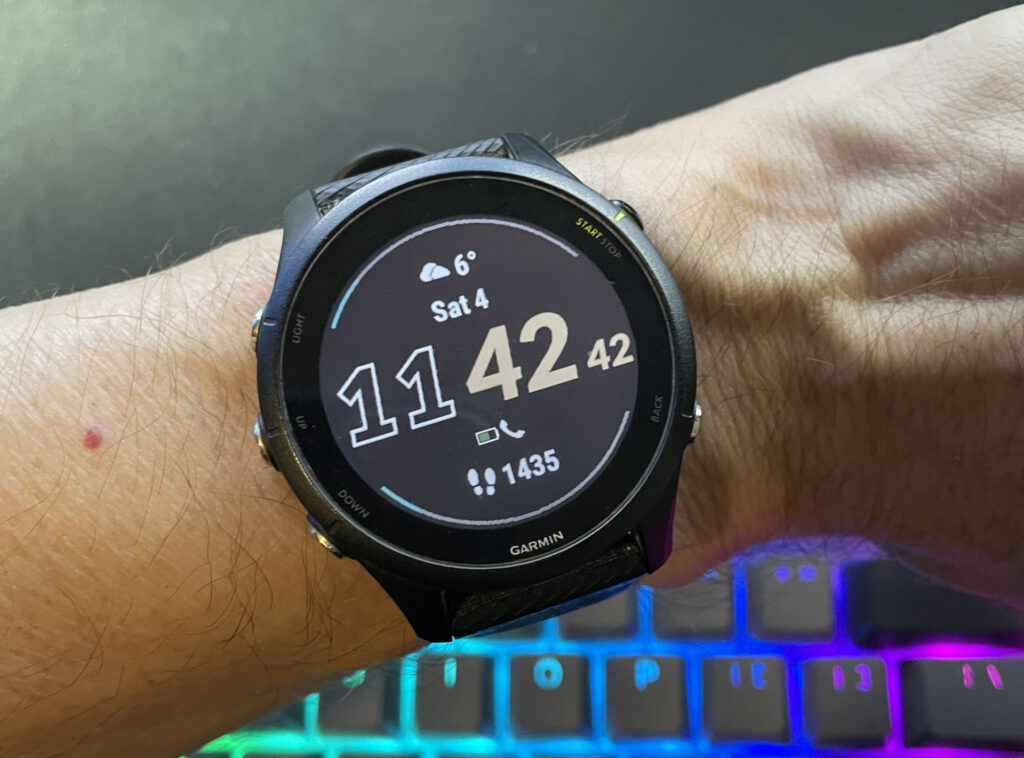By reporting stress.

Specifically, I wear a Garmin Forerunner 255 running watch. I previously had a Series 5 Apple Watch, and it served me well, but I wanted a tool more attuned to my specific needs as a thrice-weekly runner who occasionally also does long walks and other activities, like treadmill workouts.
The Forerunner has been notably better in several respects:
- Unlike Apple, Garmin doesn’t hate the web, so I can check all my stats on the web, as well as in an app.
- The running stats are more detailed, and easier to suss out.
- On the watch itself, because it has no touch display, it works fine regardless of the weather and starting/stopping/pausing a run is all built around pressing a single button, something easily done regardless of the conditions, or if I’m wearing gloves.
- The battery life is so good I essentially don’t think about it. I charge when I shower and that’s it.
Because the battery life is so good, I use it for sleep tracking. I’m aware that sleep tracking is a bit dodgy on any smart device and Ray Maker (DC Rainmaker on YouTube) said he thinks they have about 80-85% accuracy, and he uses Garmin watches only to note his start/end times (Duration) for sleep, which it usually does a good job of, then mostly ignores the other things it tracks, namely:
- Deep
- Light
- REM
- Stress
- Awake/Restlessness
Each category gets assigned a rating. For example, last night my watch said I slept 7 hours and 46 minutes, which is almost exactly what it recommended, so my Duration was rated Excellent. My Deep sleep lasted 48 minutes, which was enough to rate Fair–and so on.
The possible ratings are:
- Excellent (90-100%)
- Good (80-89%)
- Fair (60-79%)
- Poor (0-59%)
If you get Fair across the board, you’re looking at an average of around 70%, which is…Fair. But if one category ranks Poor, it can drag down your score either a modest amount, or a lot, depending on the category. One such category is Stress.
Last night, my sleep score was reported thus:

The accompanying text read:
Sleep Score 51/100
Poor Quality
Non-restorative
You slept long enough, but not well enough to bring your stress levels down overnight.
Your very stressful day yesterday may have compromised your sleep. You may feel more tired or irritable today.
Here’s where we get to my point and also that 80-85% accuracy figure Ray Maker notes. As you’ll see, my overall sleep was pretty decent–except for stress. It claims I had a “very stressful day.” My day consisted of chores, sundry tasks and the usual stuff. Nothing particularly stressful–or even stressful at all.
There were texts regarding the strata nonsense in late afternoon, which would be a stress point, but I felt pretty mellow in going through them. A few possible mitigating factors:
- I am still a bit sore from my spill last week, particularly the hands and right wrist. This may cause some kind of low-level ongoing stress?
- The bladder infection is only recently dealt with, so my body is still likely recovering from that, not quite back to normal.
Still, the previous night reported average (Fair) stress, so there’s no reason to think the above two items would affect my stress score while sleeping. Yet I do not feel the day was stressful. I woke up this morning feeling I had clearly slept better than the previous night–but with a lower score.
And I think of that 80-85% and wonder if my watch is now just kind of freaking out and interpreting everything as STRESS and reflecting it in my stats. The thing is, seeing it always reporting stress is genuinely stressful in itself, especially when I don’t feel I’m being stressed. It’s all very recursive.
I ponder whether to take the watch off at night. I’ll probably leave it on for now, but I will adjust to take the sleep scores with a bigger grain of salt, and adjust upward to giant grain as necessary.
Typing out this post probably affected my stress level, per the Forerunner.

